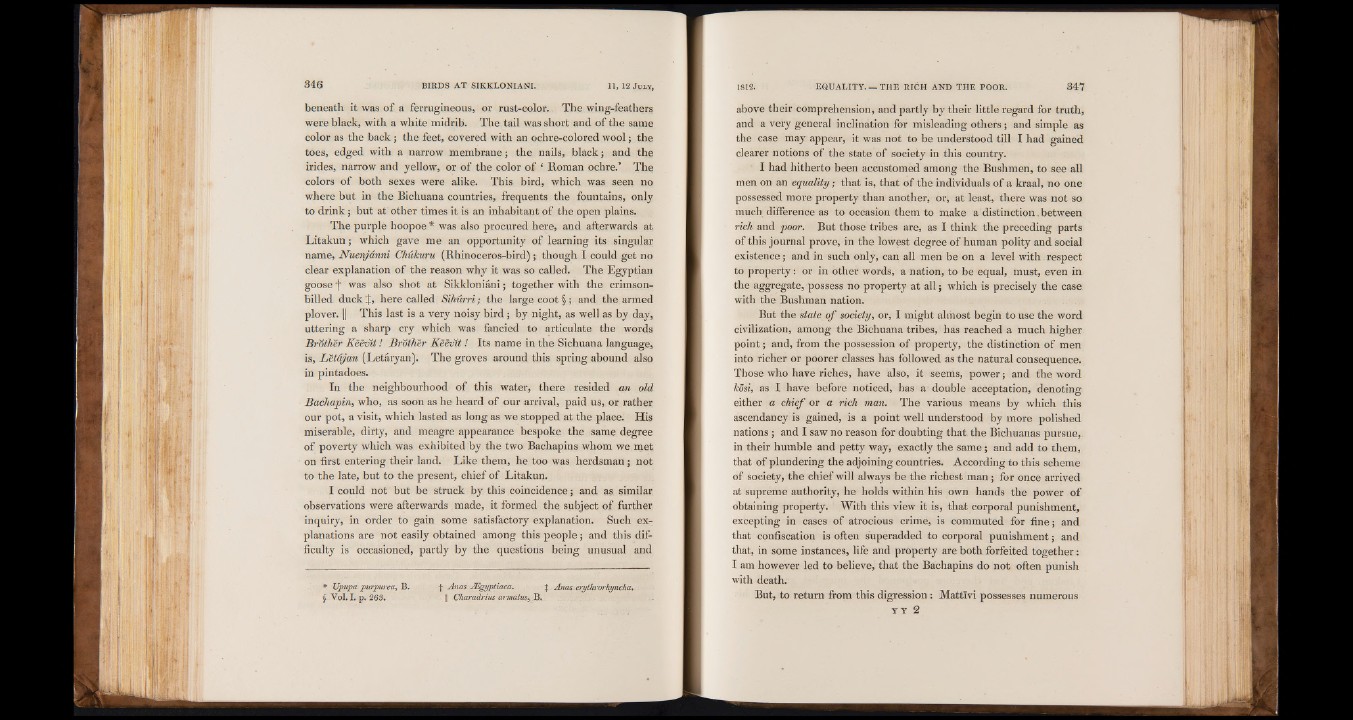
beneath it was of a ferrugineous, or rust-color. The wing-feathers
were black, with a white midrib. The tail was short and of the same
color as the back ; the feet, covered with an ochre-colored wool; the
toes, edged with a narrow membrane; the nails, black; and the
irides, narrow and yellow, or of the color of | Roman ochre.’ The
colors of both sexes were alike. This bird, which was seen no
where but in the Bichuana countries, frequents the fountains, only
to drink; but at other times it is an inhabitant of the open plains.
The purple hoopoe * was also procured here, and afterwards at
Litakun; which gave me an opportunity of learning its singular
name, Nuenjanni Chukuru (Rhinoceros-bird); though I could get no
clear explanation of the reason why it was so called. The Egyptian
goose t was also shot at Sikkloniani; together with the crimsonbilled
duck j‘, here called Sihurri; the large coot § ; and the armed
plover. || This last is a very noisy bird; by night, as well as by day,
uttering a sharp cry which was fancied to articulate the words
Brother Keewt! Brother Keevti ! Its name in the Sichuana language,
is, Lttdjan (Letaryan). The groves around this spring abound also
in pintadoes.
In the neighbourhood of this water, there resided an old
Bachapin, who, as soon as he heard of our arrival, paid us, or rather
our pot, a visit, which lasted as long as we stopped at the place. His
miserable, dirty, and meagre appearance bespoke the same degree
of poverty which was exhibited by the two Bachapins whom we met
on first entering their land. Like them, he too was herdsman; not
to the late, but to the present, chief of Litakun.
I could not but be struck by this coincidence; and as similar
observations were afterwards made, it formed the subject of further
inquiry, in order to gain some satisfactory explanation. Such explanations
are not easily obtained among this people; and this difficulty
is occasioned, partly by the questions being unusual and
* Upupa purpurea, B. f Anas JEgyptiaca. . $ Anas erythrorhyneha.
§ Vol. I. p. 263. . || Charadrius armatus, B.
above their comprehension, and partly by their little regard for truth,
and a very general inclination for misleading others ; and simple as
the case may appear, it was not to be understood till I had gained
clearer notions of the state of society in this country.
I had hitherto been accustomed among the Bushmen, to see all
men on an equality; that is, that of the individuals of a kraal, no one
possessed more property than another, or, at least, there was not so
much difference as to occasion them to make a distinction. between
rich and poor. But those tribes are, as I think the preceding parts
of this journal prove, in the lowest degree of human polity and social
existence; and in such only, can all men be on a level with. respect
to property: or in other words, a nation, to be equal, must, even in
the aggregate, possess no property at all; which is precisely the case
with the Bushman nation.
But the state of society, or, I might almost begin to use the word
civilization, among the Bichuana tribes, has reached a much higher
point; and, from the possession of property, the distinction of men
into richer or poorer classes has followed as the natural consequence.
Those who have riches, have also, it seems, power; and the word
kosi, as I have before noticed, has a double acceptation, denoting
either a chief or a rich man. The various means by which this
ascendancy is gained, is a point well understood by more polished
nations ; and I saw no reason for doubting that the Bichuanas pursue,
in their humble and petty way, exactly the same; and add to them,
that of plundering the adjoining countries. According to this scheme
of society, the chief will always be the richest man; for once arrived
at supreme authority, he holds within his own hands the power of
obtaining property. With this view it is, that corporal punishment,
excepting in cases of atrocious crime, is commuted for fine; and
that confiscation is often superadded to corporal punishment; and
that, in some instances, life and property are both forfeited together:
I am however led to believe, that the Bachapins do not often punish
with death.
But, to return from this digression: Mattlvi possesses numerous
y y 2